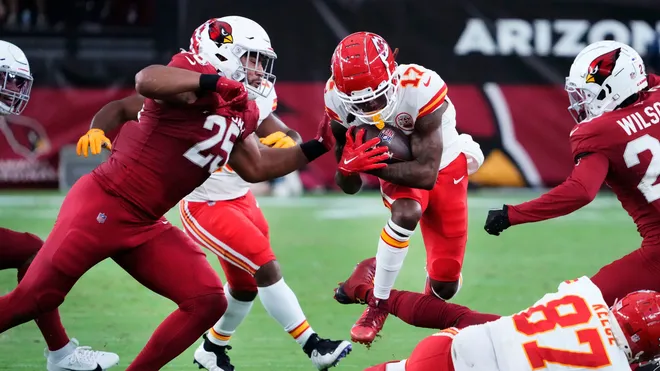The Arizona Cardinals have officially announced their preseason schedule for the upcoming NFL season, giving fans an early glimpse at the team’s preparation and the opportunity to see their favorite players in action before the regular season kicks off. Preseason games, though often overlooked by casual observers, play a crucial role for teams in fine-tuning their rosters, evaluating young talent, and establishing chemistry within the squad. For the Cardinals, the upcoming preseason presents a pivotal chance to build momentum and address key areas under the guidance of head coach Jonathan Gannon and his coaching staff.
The preseason lineup features four games, each offering distinct challenges and opportunities for Arizona. These matchups will allow the coaching staff to evaluate new acquisitions, rookies, and depth players, while also providing a platform for injured starters to regain form and demonstrate their readiness for the demanding regular season. The Cardinals’ schedule will test their mettle against a mix of familiar divisional foes and inter-conference opponents, which is a perfect setup for the team to simulate different game situations and scenarios that may arise in the regular season.
The first preseason game will see the Cardinals opening against the Denver Broncos. This matchup is not only geographically convenient, fostering a natural regional rivalry, but also strategically important. The Broncos and Cardinals have met several times in recent seasons with competitive contests, and the preseason allows both teams to assess their emerging talents in a lower-stakes environment. For Arizona, this game is an early opportunity to showcase their offseason progress, particularly on offense. The Cardinals’ quarterback situation has garnered significant attention, and this game will give both the veterans and younger quarterbacks a chance to stake their claim. Running backs and wide receivers will also be keen to demonstrate their capabilities as the offense attempts to build rhythm and consistency.
Next on the schedule, the Cardinals will face the San Francisco 49ers in a matchup that always carries a certain intensity due to their NFC West rivalry. Although it is preseason, the competitive fire between these two teams rarely dims, making this game one to watch. The 49ers are known for their physicality and well-rounded roster, providing the Cardinals’ defense with a robust challenge. This contest will be especially important for Arizona’s defensive line and secondary units, who must gel and improve their communication to stop opponents’ dynamic offensive schemes. Additionally, the coaching staff will closely monitor the performance of rookies and young defensive backs in this game, as their contributions could be vital come regular season.
The third preseason game pits the Cardinals against the Minnesota Vikings. Facing a team from the NFC North brings a fresh set of opponents and styles for Arizona to contend with. The Vikings have been building a strong roster with a balanced offensive attack and a defensive unit that can create turnovers. This game will likely see the Cardinals giving extended playing time to second- and third-string players to test their mettle against a solid opponent. Special teams units will also be under the microscope, as preseason games are critical for evaluating kickers, punters, and return specialists who can significantly influence field position and momentum in close games. The Vikings matchup serves as a valuable stage for Arizona to sharpen their execution and adapt to different tempo and play-calling strategies.
Rounding out the preseason slate, the Cardinals will face the Los Angeles Rams in a contest that promises to be both exciting and revealing. The Rams, another NFC West rival, are always a high-profile opponent, and even in the preseason, these matchups can hint at how the rivalry will shape up during the regular season. The Rams have historically boasted a strong defensive unit and an offense capable of big plays, so Arizona’s game plan will need to be versatile and adaptive. This game will likely feature many players fighting for roster spots, including undrafted free agents and practice squad hopefuls. For the Cardinals’ coaching staff, this is the last opportunity to evaluate their depth and finalize game plans before the intensity of the regular season begins.
Beyond the individual matchups, the preseason games will allow the Cardinals to test new strategies and formations. Offensive coordinator Klint Kubiak has hinted at integrating more dynamic and versatile plays, including motion and misdirection to capitalize on the athleticism of their skill players. On defense, Jonathan Gannon is expected to continue refining his aggressive schemes, aiming to pressure opposing quarterbacks and force turnovers. The preseason is an ideal time to experiment with these approaches without the full pressure of regular-season stakes, allowing players to get comfortable and make adjustments.
For many players, especially those on the bubble of making the final 53-man roster, these games are their biggest opportunity to impress coaches and secure a spot. Veteran players returning from injury will also be under scrutiny to show they have regained full health and can perform at a high level. For younger players, particularly rookies, preseason games are invaluable experience to acclimate to the speed and physicality of the NFL. The Cardinals have a promising group of rookies who have been turning heads during training camp, and fans will be eager to see how they translate their potential into live-game performance.
Additionally, preseason games provide an important chance to build fan engagement and excitement ahead of the regular season. For a franchise like the Cardinals, which has experienced highs and lows over the years, preseason success and competitive performances can generate optimism and build momentum. The team’s management has also made efforts to enhance the fan experience during these games, with promotional events, player meet-and-greets, and community outreach programs designed to strengthen the bond between the team and its loyal fanbase.
In terms of logistics, the Cardinals’ preseason schedule has been designed to minimize travel fatigue while maximizing preparation time. Most games are hosted at the team’s home stadium, State Farm Stadium in Glendale, giving the Cardinals home-field advantage and allowing fans in the Phoenix area to enjoy multiple games live. The home games will be a festive atmosphere, with fans eager to see new faces and returning stars don the Cardinal red and white. The coaching staff will appreciate the chance to work in familiar surroundings and focus on refining game plans and player development without the distractions of extensive travel.
While preseason games do not count toward the team’s regular-season record, their significance cannot be overstated. These matchups are vital for evaluating the depth chart, assessing the effectiveness of offseason adjustments, and setting the tone for the season ahead. Coaches use these games to identify strengths and weaknesses, determine player roles, and implement changes that will carry through the regular season. For the Cardinals, who are aiming to make a strong push in the competitive NFC West, the preseason will be a critical period to fine-tune every facet of their game.
Moreover, the Cardinals will closely monitor player health and conditioning throughout the preseason. Injuries in training camp and preseason games can impact the regular season, so the medical and training staff will be heavily involved in managing player workloads and recovery. The balance between pushing players to perform and protecting them from injury is delicate, but essential for the team’s success.
Fans and analysts alike will be paying attention to the quarterback competition, as it remains one of the most intriguing storylines for the Cardinals this offseason. The team has invested heavily in acquiring and developing quarterbacks, and the preseason games will offer the clearest insights into who will lead the offense once the regular season begins. Each preseason game will feature meaningful reps for these players, allowing the coaching staff to make informed decisions based on performance, decision-making, and chemistry with receivers and offensive linemen.
The preseason will also highlight the development of the Cardinals’ offensive line, a unit that has been a focal point for improvement. Pass protection and run-blocking efficiency are areas the coaching staff has emphasized in practice, and the games will be a true test against live NFL defenders. Strong performances here will boost confidence heading into the regular season and could be the difference in close games.
As the Cardinals progress through their preseason schedule, the team’s culture and identity will also be on display. Coach Jonathan Gannon has been vocal about building a team that plays with passion, discipline, and resilience. The preseason games will be a first opportunity to see these values translated on the field. From the energy on the sidelines to the intensity of the players, these games serve as a preview of the kind of team Arizona hopes to be: competitive, cohesive, and capable of contending in one of the NFL’s toughest divisions.
In conclusion, the Arizona Cardinals’ preseason schedule offers a comprehensive and exciting series of matchups that will be essential in shaping the team’s fortunes for the upcoming NFL season. From the opener against the Denver Broncos, through battles with the San Francisco 49ers and Minnesota Vikings, to the finale against the Los Angeles Rams, every game carries significance beyond just the final score. These contests will provide the coaching staff with the insights needed to build a competitive roster, give players a platform to prove their worth, and engage the fanbase with a preview of what’s to come. As the Cardinals prepare to take the field in these preseason games, anticipation is high, and hope is strong that the team will use this valuable time to set the foundation for a successful season ahead.



